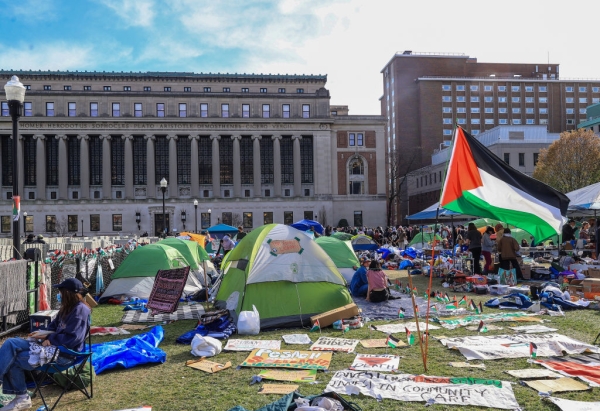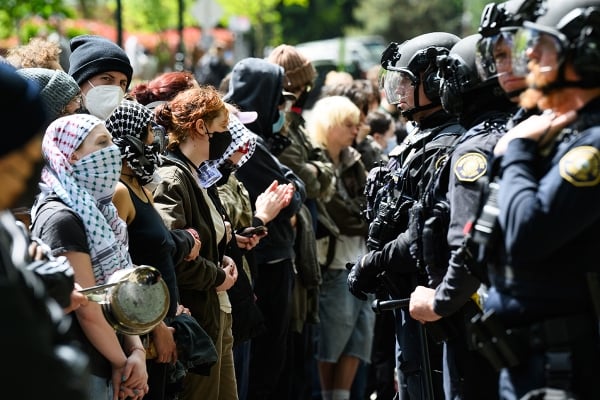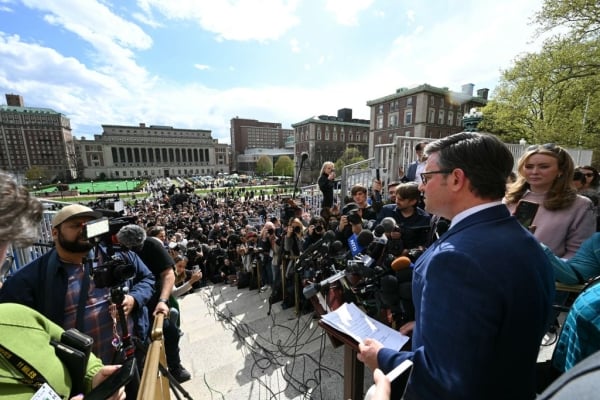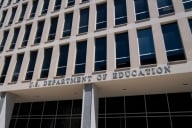You have /5 articles left.
Sign up for a free account or log in.

Photo illustration by Justin Morrison/Inside Higher Ed | Tayfun Coskun/Anadolu, Lawrence Iles/Icon Sportswire, Bill Clark/CQ-Roll Call Inc, Spencer Platt, Mathieu Lewis-Rolland via Getty Images
For the third time since December, leaders of prominent universities are set to testify before a House committee about their responses to antisemitic incidents and protests critical of Israel’s war in Gaza. The first two hearings led to serious, disruptive consequences for the presidents, their campuses and higher education writ large—and this one could bring more of the same.
Thursday’s hearing, titled “Calling for Accountability: Stopping Antisemitic College Chaos,” comes on the heels of a tumultuous month in higher education. In the 36 days since the last hearing on campus antisemitism focused on Columbia University, colleges and universities have grappled with a wave of protests and campus unrest. Scenes of students camping on university lawns and clashing with police have spurred a wave of criticism about the state of higher education in America, with conservatives saying the protests show the liberal bias on campuses and questioning whether tax dollars should fund elite institutions.
This hearing will feature the leaders of Northwestern University, Rutgers University and the University of California, Los Angeles. Originally, the presidents of Yale University and the University of Michigan were slated to testify as well. But the committee added Northwestern and Rutgers to the docket instead after the universities reached agreements with student protesters, prompting the ire of lawmakers.
“These presidents who are giving into these threats by these college students are spineless,” Representative Virginia Foxx, the North Carolina Republican who chairs the committee, told Fox News on Tuesday. “They should not be doing this … Our universities have lost their way.”
For Foxx and other Republicans on the committee, this week’s hearing will offer another chance to excoriate campus leaders for their handling of campus protests and responses to antisemitic incidents. Republicans in Congress have made it clear in the last month that they view the protests as a “national disgrace.”
The previous hearings have rocked higher ed, and this one likely will be no different, given Republicans’ penchant for creating viral moments and making university administrators crack under the pressure of relentless grilling.
Higher education experts and advocates say these hearings amount to unprecedented Congressional interference into universities’ internal affairs that could undermine higher education broadly, erode academic freedom and curtail free speech on campuses. Experts have said they hear echoes of McCarthyism in the hearings and other Congressional investigations into colleges.
Join us Thursday for live coverage of the latest House antisemitism hearing, starting at 8:45 a.m.
The university presidents have taken radically different approaches in the two previous hearings—and run into different sets of problems. After the first hearing in December, the presidents of Harvard University and the University of Pennsylvania resigned amid backlash to their testimony. Both presidents had declined, under repeated questioning, to clearly state that calls for the genocide of Jews violated their campus conduct policies. Columbia University Minouche Shafik forcefully denounced antisemitism in the April 17 hearing and condemned the comments of several faculty members who were critical of Israel. When she got back to campus, she was accused of throwing faculty members and academic freedom under the bus.
But while Shafik’s decision to seemingly placate Republicans on the committee stirred controversy, her actions after the hearing sparked the most blowback as well as a nationwide wave of protests. Those were some of the aftershocks to the second hearing. As the higher education community braces for the third hearing, here’s a look at the key developments from the wild month that followed the testimony in April.
Rise of Encampments
The day after Shafik told the House committee that she had “no hesitation in enforcing our policies,” the president made good on her promises. She called in the New York Police Department to clear an encampment on a university lawn that was erected on the morning of her hearing. More than 100 students were arrested.
Students across the country subsequently set up encampments in solidarity with the people of Gaza and the students at Columbia, with some occupying campus buildings and declaring they wouldn’t leave until their universities agreed to divest from companies that are financially benefiting from the war in Israel, among other demands. Those who protested have faced suspensions and other consequences, including arrest.

Pro-Palestinian protests have expanded rapidly from Columbia University to universities across the nation.
Anadolu/Getty Images
At Columbia, calling in the NYPD only inflamed tensions. An Orthodox Union rabbi at Columbia told Jewish students to go home because the university wasn’t safe. Columbia officials closed the campus to outsiders and canceled in-person classes. The situation reached a fever pitch in late April when a group of students took over a campus building. Shafik, who had said she wouldn’t call the NYPD back to campus, reversed course and had city cops clear out the building. She said she was “left with no choice.” This time, NYPD arrested more than 100 people, most of whom were students.
Because of the campus discord, Shafik called off Columbia’s main commencement ceremony, though ceremonies for individual schools continued. Several other universities altered their graduation plans because of the protests. The University of Southern California was the first to do so on April 26 following protests stemming in part from the president’s decision to cancel the valedictorian’s graduation speech.
Universities that moved forward with traditional ceremonies risked disruptions, though not many materialized. At a handful of universities, students walked out or waved the Palestinian flag in protest.
Crackdowns and Negotiations
Students have been protesting the war in Gaza since early October after Hamas attacked Israel, but in recent weeks, some university leaders followed Shafik’s example and used force to clear out encampments and quell protests. Faculty members have been caught up in the crackdowns as well. So far, more than 3,000 people have been arrested, according to the Associated Press.
The use of force, which included rubber bullets and tear gas, alarmed students, First Amendment experts and others who said it was “an assault on free speech.” On the other hand, some Republicans in Congress wanted to go further and urged governors and President Biden to call in the National Guard to protect Jewish students.

Police and pro-Palestinian protesters stand-off in front of the barricaded Portland State University library.
Mathieu Lewis-Rolland/Getty Images
Universities also have quietly changed protest policies to justify clearing out the encampments, fueling more concerns about the state of campus free speech.
While some administrators have taken a hard line with protesters, others, including those at Northwestern and Rutgers, have reached out to talk and negotiate an end to the encampments.
Protesters at Northwestern agreed to take down their tents and silence sound systems in exchange for scholarships for five Palestinian undergraduates and a gathering space for Middle Eastern, North African and Muslim students, among other provisions.
Presidents and senior university administrators found themselves in hot water whether they sent in the cops or dealt with protesters. Just last week, Sonoma State University President Mike Lee was placed on leave—then decided to retire—after he announced a deal with student protesters that included reviewing university contracts to consider divestment possibilities.
Lawmakers Pile On
Following the April hearing, Republicans in Congress have capitalized on the campus unrest to ramp up their scrutiny of higher education.
Members traveled to Columbia University to inspect the encampments and criticize the university’s handling of the protest and demanded Shafik’s resignation. The House also passed legislation that would codify a broad definition of antisemitism into federal law. Critics say the definition is overly broad and conflates criticism of the Israeli government with antisemitism, which could lead college administrators to further crack down on anti-Israel protests.

House Speaker Mike Johnson held a press conference on the steps of Columbia University’s Low Library.
TIMOTHY A. CLARY/AFP via Getty Images
House Speaker Mike Johnson, after visiting Columbia, announced a House-wide effort to crack down on campus antisemitism, threatening the funding of universities that Republicans say are violating federal civil rights laws by not adequately protecting Jewish students. This effort will build on the work of the House Education and Workforce Committee, which has opened investigations into campus antisemitism at at least eight institutions. The committee released its first investigative report last week, criticizing how Harvard University officials responded to antisemitic incidents.
“Antisemitism is a virus and because the administration and woke university presidents aren’t stepping up, we’re seeing it spread,” Johnson said. “We have to act, and House Republicans will speak to this fateful moment with moral clarity.”
Some Congressional Democrats and President Biden also condemned the protests, specifically the occupation of university buildings.
Republican lawmakers also demanded that Education Secretary Miguel Cardona do more to combat campus antisemitism—including pulling federal funding from colleges that fail to protect Jewish students. Cardona condemned the protests at Columbia and other colleges and urged Congress to give the Office for Civil Rights (OCR) more money to support investigations of alleged civil rights violations.
Since the start of the Israel-Hamas war, OCR has opened 75 investigations of colleges and universities over complaints about discrimination based on shared ancestry, which includes both Jews and Muslims and is prohibited under Title VI of the Civil Rights Act of 1964.
Higher Ed Pushes Back
In the face of the intense attacks, higher education groups and leaders have begun pushing back and speaking out more forcefully about the threats to academic freedom and free speech on campuses—and about what they see as “unacceptable” Congressional interference into higher education.
“The message conveyed by these hearings—that politicians have the right to control what is or is not taught in a college classroom and the authority to dictate what can or cannot happen on a college campus—is repressive and completely unacceptable in a free society,” Irene Mulvey, president of the American Association of University Professors, said Monday in a statement.
The presidents’ responses at the last two hearings have driven news cycles, caused institutional shakeups and helped cause tumult on campuses across the country. What the leaders of Northwestern, Rutgers and UCLA say Thursday could prove equally consequential. Mulvey is among those calling for the university leaders to stand up for their values and forcefully defend academic freedom.
“Defensiveness and lawyerly obfuscation cost the presidents of Harvard and Penn their jobs,” she said. “Throwing academic freedom and faculty under the bus led to an overwhelming faculty vote of no confidence against the president of Columbia, and her attempt at appeasement did not prevent a call for her resignation from the Speaker of the House.”
AAUP isn’t the only one sounding the alarm. On Monday, hundreds of Jewish faculty members called on House Democrats in a news release to “forcefully counter the House GOP’s naked weaponization of antisemitism to smear political opponents, justify the violent repression of peaceful protest and discredit higher education.”
Leaders from faculty unions at UCLA, Northwestern and Rutgers are also speaking out against the committee’s actions. A press conference featuring faculty members and Randi Weingarten, president of the American Federation of Teachers, will be held this afternoon and union members are planning to attend the hearing. Faculty unions didn’t offer a similar show of support before the last two hearings.
“We believe this hearing and previous actions of the Committee represent an attack on the foundations of higher education and are part of a wider extremist effort to stifle and curtail freedom of speech, freedom of assembly, and freedom of expression throughout society,” the unions said in a joint statement. “Defending our universities at this moment is necessary to defend the basic principles of U.S. democracy.”
Likewise, the American Association of Colleges and Universities (AAC&U) said that Congress is using campus responses to the Israel-Hamas war “as a pretext to exert political pressure on college and university leaders to restrict academic freedom and freedom of expression.”
This week’s hearing, the AAC&U said, will likely be “performative rather than informative.”
“The hearing must be seen for what it is: a further escalation in an ongoing partisan attack on higher education that proceeds by taking aim at academic values and principles that are fundamental to advancing knowledge, developing an informed citizenry, and serving the common good,” the group wrote. “For a uniquely diverse national system of higher education whose unrivaled quality depends on a model of governance intended to shield it from direct government control and political interference, this attack constitutes an existential threat.”








